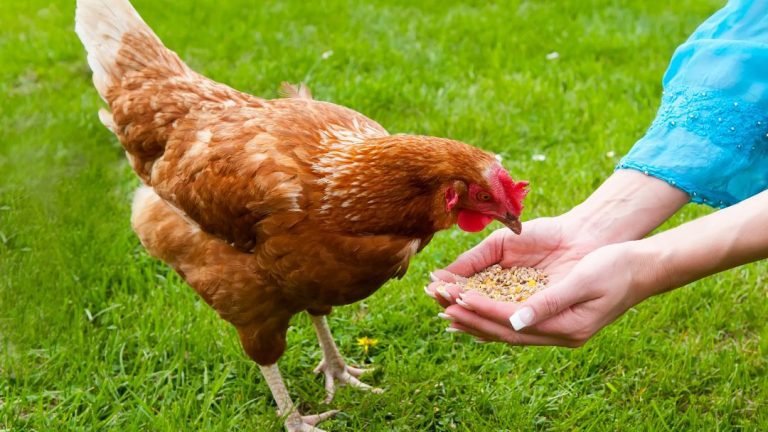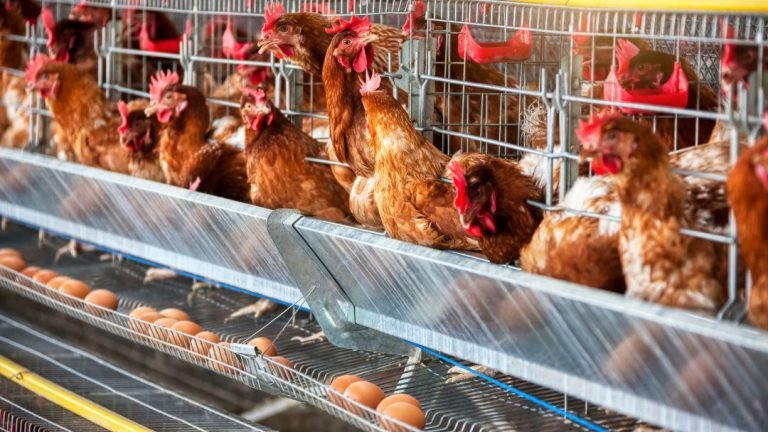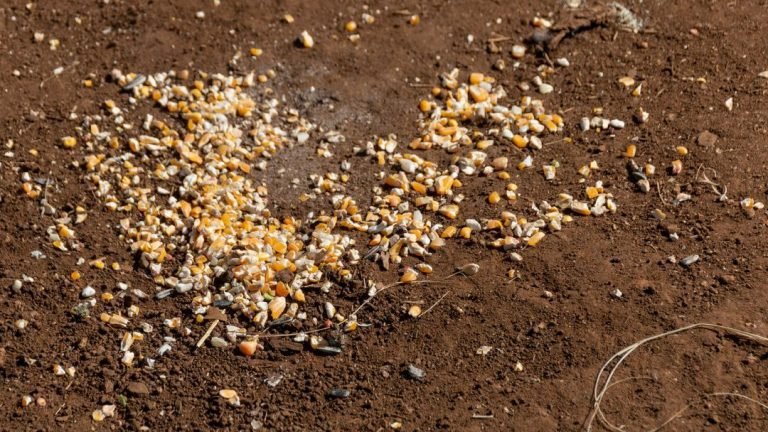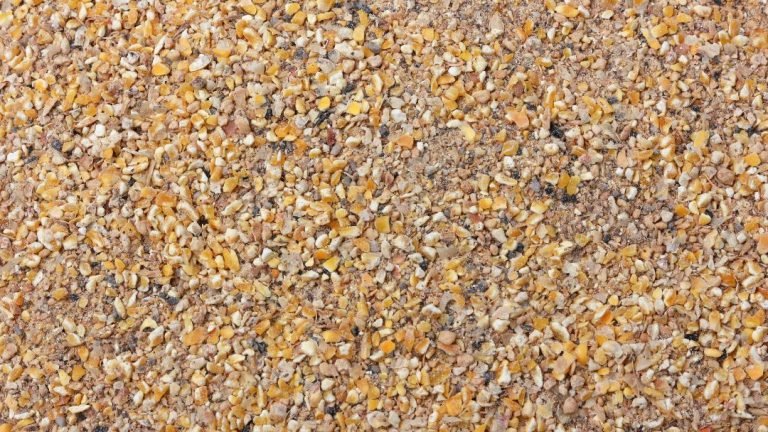Medicated chicken feed has been around for several decades. The first medicated chicken feed was developed in the 1950s. Ralston Purina’s company introduced it in the United States in the 1950s. Later, it has since been adopted by other countries around the world.
What does medicated chicken feed do? Medicated chick feed contains Coccidiostats and Antibiotics to protect younger chickens from coccidiosis and various infectious diseases by developing a strong immunity system to fight against different types of illness.
What Does Medicated Chicken Feed Do?
The main objective of feeding starter-medicated chicken feed is to protect baby chicks from coccidiosis, which is mainly a common intestinal disease.
The mortality rate of coccidiosis is pretty high, can be more than 50%.
Protozoan parasites of the genus Eimeria mainly cause this disease. Baby chicks get this illness by ingesting soil or the droppings of other chickens.
But dirty water or contaminated food can also cause this disease. They are likely to have this illness within 3-6 weeks old.
Medicated chick feed contains Amprolium that blocks the uptake of thiamine in coccidia. This thiamine analog prevents and treats intestinal coccidiosis.
More importantly, it develops a powerful immunity system to fight against coccidia.
Besides, medicated chick feed protects baby chicks from bacterial infections and vitamin deficiencies.
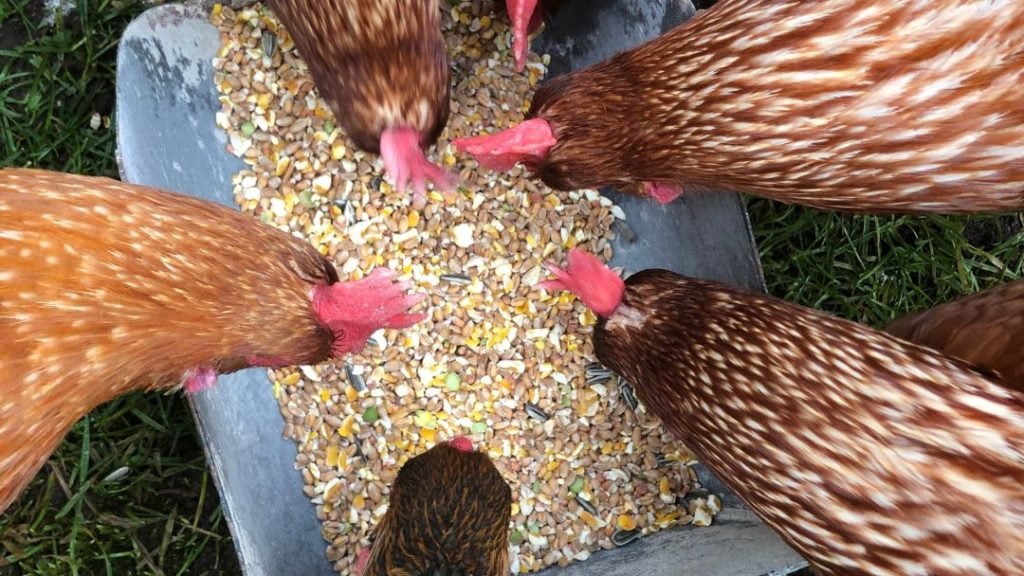
What Ingredients Does Medicated Chick Feed Have?
Medicated chick feed contains many ingredients to provide baby chicks with optimal health and safety and ensure essential nutrition.
01. Antibiotics
Some medicated chick feed contains antibiotics to improve baby chicks’ performance and promote growth. More importantly, it gives protection from infection.
Various types of Antibiotics are used in medicated baby chicks, such as tetracyclines, Aminoglycosides, Bambermycins, Ionophores, and penicillins.
They mainly protect younger chickens from colibacillosis, necrotic enteritis, and other intestinal infections.
Chicken keepers mainly use them during the first week of life. It decreases harmful bacteria entering the food supply.’
For example, Tetracyclines usually work as bacteriostatic antibiotics. But it should not be used for baby chicks for more than 14 consecutive days.
Likewise, Ionophores work great against intestinal infections, Lincosamides for combat joint and bone infections, and Aminoglycosides for intestinal infections.
02. Coccidiostats
This is an essential ingredient in medicated chicken feed. It controls coccidiosis and maintains intestinal integrity.
The main job of Coccidiostats is to help to develop a strong immunity system to fight against various infections.
Manufacturers use various Coccidiostats in medicated chicken feed, such as Amprolium, Monensin sodium, Lasalocid, Salinomycin, Decoquinate, etc.
Amprolium is one of the most common Coccidiostats, which blocks thiamine uptake in coccidia.
Monensin sodium and Lasalocid show effective results against Gram-positive bacteria,
But they must be used in a limited amount. For instance, Salinomycin should not use more than 15 grams per ton. Otherwise, it will harm baby chickens.
03. Vitamins And Minerals
The medicated chicken feed contains various vitamins, such as vitamin A, vitamin D, vitamin E, etc.
Vitamin A will ensure regular growth and good condition of epithelial cells. Besides, it is crucial for a healthy immune system.
One primary reason for feeding vitamin D-rich nutrients is to keep baby chicks protected from rickets. Otherwise, it may cause leg and beak deformities.
Vitamin E contains essential fatty acids (e.g., linolenic acid) that protect baby chicks from respiratory infections. It also contributes to the immune response and the functioning of nerves.
Medicated chicken feed also has calcium to support their nervous system, activate enzymes in their digestive system, and help with blood clotting.
It is also essential for developing strong, healthy bones.
04. Protein
A medicated chicken feed contains at least 18.0% protein. Baby chicks need a sufficient amount of protein to develop and make their muscle and bone stronger.
Many of them have soybean meal, known as one of the best protein sources.
It supports rapid metabolism and growth rate.
Some medicated chicken feed contains fish meals as it has a good balance of amino acids and unsaturated fatty acids.
It ensures the proper development of immune function
A few options may have dried whey to improve feed conversion and weight gain.
It also aids younger chickens in nitrogen retention to produce dramatically leaner chickens.
05. Grains
Medicated chicken feed also has various healthy grains, such as corn, wheat, barley, etc.
Corn is easy to digest and offers a higher amount of calories. One pound of corn contains around 1520 kilocalories. It is a good source of carbohydrates to generate energy.
Medicated baby chicks also contain wheat to improve their digestive tracts. It boosts their capabilities to resist the coccidiosis challenge.
If your chickens hatched chicks during the winter month, you could choose a medicated chicken feed that has barley.
It works as a boredom buster for younger chickens during the winter months. However, it must be less than 25% as excessive amounts affect baby chicks’ overall health conditions.
06. Fats And Oils
Baby chicks need a minimum amount of fat to produce energy and essential fatty acids.
Many medicated chicken feed contains vegetable oil to increase their energy density.
Besides, it is a rich source of essential fatty acids for better growth and production performance.
Also, vegetable oil has fat-soluble vitamins to develop and prevent encephalomalacia/crazy chick disease properly.
Some medicated chicken feed may have animal fat in a small proportion. They are usually collected from pork and beef.
A limited amount of animal fat helps baby chicks build muscle, develop new feathers, and maintain body temperature.
What Are The Different Types Of Medicated Chicken Feed?
Medicated chicken feed is available in various types. Coccidiostats are one of the most common options, which is effective against coccidiosis.
Some options have antibiotics to prevent or treat bacterial infections, such as respiratory infections or enteritis.
Besides, a few medicated chicken feeds contain Antifungal agents to prevent or treat fungal infections, such as aspergillosis.
Examples of antifungal agents used in chicken feed include nystatin and amphotericin B.
In addition, Antiparasitic drugs are another option used in Medicated chicken feed. It works effectively against parasitic infections, such as worms.
Common examples of antiparasitic drugs used in medicated feed include fenbendazole and levamisole.
Is It Mandatory To Feed Medicated Chicken Feed?
Feeding medicated chicken feed is not mandatory if baby chicks are still healthy.
You can also skip feeding medicated chicken feed if they only have a small number of protozoa in their body.
But when their body has a huge amount of protozoa, it is essential to feed medicated chicken feed to inhibit the protozoa that cause coccidiosis.
Alternatives of Medicated Chicken Feed
Some chicken owners don’t feed medicated feed to their baby chicks.
Instead, they feed them a small amount of dirt, such as soil or sand, from the surrounding environment to introduce protozoa into their body.
It will work as a natural source of coccidia oocysts, which can help stimulate the chicken’s immune system to develop resistance to the parasite.
However, the dirt should be free of contaminants, such as heavy metals or pesticides.
Also, make sure to choose dry and free of moisture dirt to prevent the growth of harmful bacteria or fungi.
You can collect dirt from their previously lived or foraged location. Alternatively, purchase clean, sterile soil or sand specifically designed to feed chickens.
How Much Medicated Chicken Feed To Feed Baby Chicks?
Baby chicks generally need around 1-2 ounces of medicated feed daily for the first 8 weeks.
Hence, each younger chicken will eat around 0.75 to 1 pound of feed in each week.
Giving chicks free access to medicated feed 24 hours a day is best. They usually eat 4-6 meals in each day at a minimal amount in each meal.
Make sure you continuously monitor the chicks’ behavior and growth to ensure that they are getting enough feed.
Overfeeding or underfeeding can lead to problems such as obesity, malnutrition, or digestive issues.
Following the manufacturer’s instructions for the medicated feed is a good rule of thumb.
You can also discuss with a qualified veterinarian or poultry nutritionist to develop an appropriate feeding program for your chicks.
How Long Do Chicks Need Medicated Feed?
It can be anywhere from two weeks to four weeks. But the duration can be higher if you start feeding it lately.
Generally, chickens need medicated feed at least two to three weeks after they first hit the ground.
You have to give your feathered friends enough time to develop a strong immunity to fight against various infections.
Chicken keepers should gradually shift to non-medicated feed. Avoid completely feeding non-medicated feed suddenly.
Younger chickens may not like it. Reduce the medicated feed intake and increase non-medicated feed slowly.
Make sure you don’t mix them together. It will affect overall nutritional efficiency. Instead, serve both in separate pots and let them eat independently.
What Are The Medicated Chicken Feed Regulations And Safety Standards?
The Food and Drug Administration (FDA) plays the role of the government agency founded in 1906.
They set safety standards and regulations for using medicated chicken feed to protect both animal and human health under the Animal Drug Availability Act of 1996.
This law requires that all animal drugs, including those used in medicated feed, must be approved by the FDA and have a withdrawal period.
The FDA also monitors the safety and effectiveness of medicated feed through inspections and sampling programs for contaminants and ensuring accurate dosing of medications.
Tips For Feeding Medicated Chicken Feed To Baby Chicks
- Choose the right type of medicated chicken feed based on your baby chicken’s requirements, such as Coccidiostats for coccidiosis and antibiotics for bacterial infections.
- Start feeding medicated chicken feed as early as one day old to develop strong immunity faster.
- Continuously track your younger chickens’ movements and see if they have any health issues.
- Make sure to follow the manufacturer’s instructions for recommended dosage and feeding schedule.
- It is important not to overfeed your baby chicks, which can lead to health problems. Monitor your chicks’ weight and growth.
- Use it as directed by the manufacturer. Don’t use it for longer than recommended or at higher doses. It can lead to health problems and antibiotic resistance.
Summing UP
It is not mandatory to feed medicated chick feed to younger chickens.
Chicken keepers often rely on other methods, such as natural remedies, vaccinations, or strict biosecurity measures, to prevent diseases in their flocks.
But if they are not vaccinated for coccidiosis or other methods are not practical, feeding them medicated good feed is a good practice.
It can significantly lower the mortality rate. Do you know 80% of all commercial poultry firms use medicated chicken feed?
Hopefully, you got a clear overview of “What does medicated chicken feed do?”



